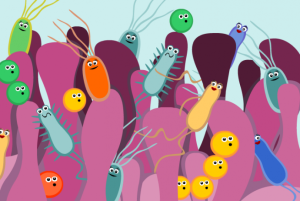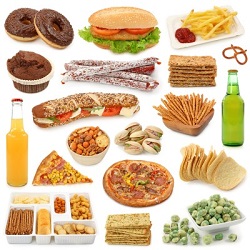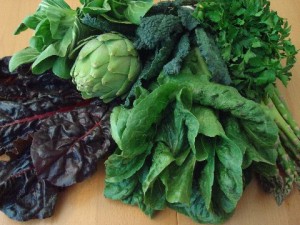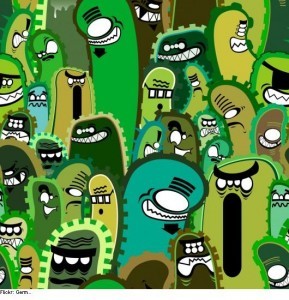
Gut flora, alkalinity and intestinal parasities – Eeek!
What is gut flora?
Gut flora (microbiota) is the name given today to the microbe population living in our intestines. It contains tens of trillions of micro-organisms, including at least 1000 different species of known bacteria with more than 3 million genes (150 times more than human genes). Microbiota can, in total, weigh up to 2 kg. One third of our gut microbiota is common to most people, while two thirds are specific to each one of us. In other words, the microbiota in your intestine is like an individual identity card.
Why is it important?
While each of us has a unique microbiota, it always fulfils the same physiological functions and they have a direct impact on our health:
•It helps the body to digest certain foods that the stomach and small intestine have not been able to digest.
•It helps with the production of some vitamins (B and K).
•It helps us combat aggressions from other microorganisms, maintaining the wholeness of the intestinal mucosa.
•It plays an important role in the immune system, performing a barrier effect.
•A healthy and balanced gut microbiota is key to ensuring proper digestive functioning.
What does pH in the body mean?
pH stands for power of hydrogen, which is a measurement of the hydrogen ion concentration in the body. The total pH scale ranges from 1 to 14, with 7 considered to be neutral. A pH less than 7 is said to be acidic and solutions with a pH greater than 7 are basic or alkaline.
How does this affect our health?
When we eat acid-forming foods, our body works to bring our blood pH back into balance by releasing alkaline-rich minerals into our bloodstream (e.g. calcium, phosphorus and magnesium).
If we are not eating enough alkaline-forming foods, then our body has to pull these minerals from our bones, teeth and organs. This can compromise our immune system, cause fatigue and make us vulnerable to viruses and disease.
How do we keep the pH balanced to prevent illness and disease?
Maintaining an approximate 80% alkalinity and 20% acidity diet is the best way to maintain wellness.
Acidic foods (alcohol, refined sugars, coffee, fast foods, chocolate, red meat, fish, dairy) are foods that are associated with disease. A highly acidic diet creates a favourable environment for yeast, fungus, abnormal cells and even parasites to multiply and grow.
Alkaline foods (most fruit and vegetables such as leafy greens, lemons, citrus fruits, berries, broccoli, cabbage, nuts, herbal tea) are foods which maintain and prevent disease from occurring in the body.
What are intestinal parasites?
Even the word “parasite” sounds terrible. Like a villain, living off the goodness within you! Eeek!
Parasites infect the gastro-intestinal tract of humans and other animals. They can live throughout the body, but most prefer the intestinal wall. Means of exposure include: ingestion of undercooked meat, drinking infected water, and skin absorption.
What’s the plan to get them out of you ASAP!?
Antibiotics are advised for intestinal parasites from your GP. However there are other options and/or in combination:
Firstly, the 4 R’s:
1. Remove the micro-organisms that shouldn’t be there, as well as toxic foods (acidic) you shouldn’t be eating
2. Replace/restore the nutrients, bacteria, intestinal flora (pre and probiotics)
3. Repair the cell on every level
4. Relaxation! – Stress, anxiety etc
Remove – Many qualified health practitioners can sort a digestive cleanse for you, using anti-microbials which first rid the body of the unwanted organisms. This can be a long haul as the organism will continue to reproduce.
Including colonics – a colon enema cleanse which literally involves flushing the colon with water and herbs.
Removing foods that have inflammatory properties will aid the whole process – wheat, gluten, soy, dairy, sugar, alcohol, fructose.
Replace/restore – In addition to the above digestive cleanse, probiotics are taken at the same time to restore the yummy gut flora. Probiotics can be taken in tablet form, yoghurt, kombucha (a fermented herbal tea – see my how to make kombucha post) or fermented vegetables. I would recommend all of the above, except for dairy during the cleanse.
Maintaining a diet that is 80% alkaline will create an unhappy environment for the parasites as they enjoy the acidity.
Repair – Additional supplements and herbs can be prescribed for you which will improve your overall health, aside from probiotics etc. Such as immune support which is a common imbalance to get parasites, worms etc in the first place. Seeking treatment from a qualified practitioner such as Chinese medicine would be ideal.
Relax – A key rule in life, not just for intestinal upsets. Regular exercise, sleeping well, good emotional-mental health, breathing deeply etc.
Note:
Intestinal parasites can be missed in stool samples, so ask your doctor for 2 or 3 samples to do a week a part just in case.
Following up with stool tests 3 and 6 months after being diagnosed is ideal. They will most certainly want to survive in you!
You may think “oh gosh it will be such a long process to rid these parasites” … but your whole digestive system will have improved and I will guarantee you will learn more about your health, diet and lifestyle in the process !!
Take care of you, see you in the clinic,
TK xx
Learn more > http://www.tanyakeamwellness.com





